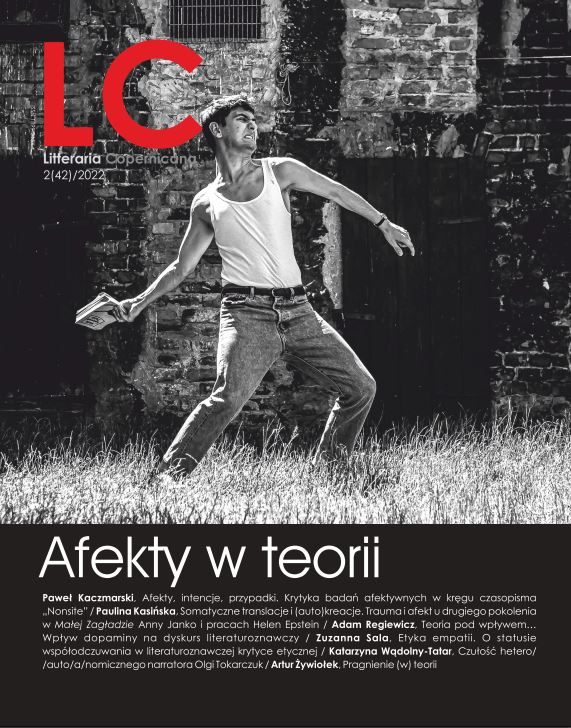Desire in/for Theory
DOI:
https://doi.org/10.12775/LC.2022.018Keywords
desire, theory, thinking, affectAbstract
The primary aim of the article is to reflect on the relationship between theoretical thinking (theorising) and affects, the predominant among which seems to be desire. It is, after all, the result of a lack, insatiability, and the need for an intellectual grasp of the Whole (unity of all things). The relationship between thinking and emotions set the basic horizon of the European imagination. The standpoints of thinkers such as Gonçalo Tavares, George Steiner, Gilles Deleuze, Félix Guattari, and especially Martin Heidegger, presented in this article clearly demonstrate the hybrid status of theorizing. Affective and rational thinking are not mutually exclusive, on the contrary: they form a complementary tangle that includes both rigorous scientific procedures and numerous (conscious and subconscious) emotions, such as desire, delight, amazement, disappointment, melancholy, and hope. Building a theory arises not only from negation and opposition to the existing scientific systems, but also from the need to accept, acknowledge or affirm one’s own “self ” and the surrounding reality.
References
Arystoteles 2013. Metafizyka. Tłum. K. Leśniak. Warszawa: Wydawnictwo Naukowe PWN.
Bachelard, Gaston 1995. Lautréamont. Paris: José Corti.
Bartoś, Tadeusz 2020. Klątwa Parmenidesa. Eseje metafizyczne. Warszawa: Wydawnictwo Naukowe PWN.
Bergson, Henri 2021. Myśl i ruch. Eseje i wykłady. Tłum. E. Walerich. Warszawa: Wydawnictwo Naukowe PWN.
Budrewicz, Zofia; [&] Roma Sendyka, Roma; [&] Ryszard Nycz, Ryszard (red.) 2014. Pamięć i afekty. Warszawa: Wydawnictwo IBL.
Deleuze, Gilles/ [&] Félix Guattari, Félix 2000. Co to jest filozofia?. Tłum. Paweł Pieniążek. Gdańsk: słowo/obraz terytoria.
Gadamer, Hans-Georg 2007. Prawda i metoda. Zarys hermeneutyki filozoficznej. Tłum. Bogdan Baran. Warszawa: Wydawnictwo Naukowe PWN.
Heidegger, Martin 2007. Odczyty i rozprawy. Tłum. Janusz Mizera. Warszawa: Wydawnictwo Aletheia.
Heidegger, Martin 2017. Co zwie się myśleniem. Tłum. Janusz Mizera. Warszawa: Wydawnictwo Aletheia.
Jaeglé, Claude 2013. Portret oratorski Gilles’a Deleuze’a o kocim spojrzeniu. Tłum. Małgorzata Jacyno. Warszawa: Oficyna Naukowa.
Leder, Andrzej 2016. Rysa na tafli. Teoria w polu psychoanalitycznym. Warszawa: PWN.
Massumi, Brian 2013. „Autonomia afektu”,. „Teksty Drugie” nr 6: 111-–134.
Nycz, Ryszard 2014. „Afektywne manifesty”. „Teksty Drugie” nr 1: 9-–13.
Skarga, Barbara 1980. „Złudzenia transcendentalizmu”,. „Teksty” 1980 nr 1: 9-–36.
Sławiński, Janusz 2000. „Zwłoki metodologiczne”,. W: Janusz Sławiński. Teksty i teksty. Prace wybrane,. tom IIIT. 3. Kraków: Wydawnictwo Universitas: 43-53.
Steiner, George 2007. Nauki mistrzów. Tłum. Jerzy Łoziński. Poznań: Wydawnictwo Zysk i S-ka.
Steiner, George 2016. Poezja myślenia. Od starożytnych Greków do Celana. Tłum. Bogdan Baran. Warszawa: Wydawnictwo Aletheia.
Tavares, Gonçalo M. 2017. Encyklopedia. Notatki. Tłum. Wojciech Charchalis. Gdańsk: słowo/obraz terytoria.
Downloads
Published
Versions
- 2022-11-09 (3)
- 2022-07-28 (2)
- 2022-07-27 (1)
How to Cite
Issue
Section
License
Copyright (c) 2022 Artur Żywiołek

This work is licensed under a Creative Commons Attribution-NoDerivatives 4.0 International License.
Stats
Number of views and downloads: 141
Number of citations: 0



